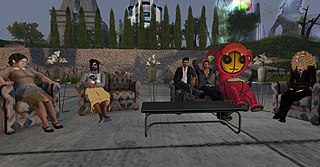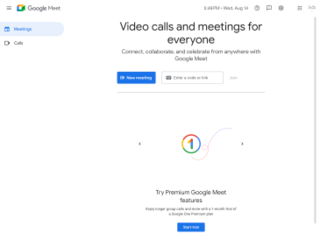Related Research Articles

Virtual reality (VR) is a simulated experience that employs 3D near-eye displays and pose tracking to give the user an immersive feel of a virtual world. Applications of virtual reality include entertainment, education and business. VR is one of the key technologies in the reality-virtuality continuum. As such, it is different from other digital visualization solutions, such as augmented virtuality and augmented reality.

Augmented reality (AR) is an interactive experience that combines the real world and computer-generated 3D content. The content can span multiple sensory modalities, including visual, auditory, haptic, somatosensory and olfactory. AR can be defined as a system that incorporates three basic features: a combination of real and virtual worlds, real-time interaction, and accurate 3D registration of virtual and real objects. The overlaid sensory information can be constructive, or destructive. As such, it is one of the key technologies in the reality-virtuality continuum.

The metaverse is a loosely defined term referring to virtual worlds in which users represented by avatars interact, usually in 3D and focused on social and economic connection.

Unity is a cross-platform game engine developed by Unity Technologies, first announced and released in June 2005 at Apple Worldwide Developers Conference as a Mac OS X game engine. The engine has since been gradually extended to support a variety of desktop, mobile, console, augmented reality, and virtual reality platforms. It is particularly popular for iOS and Android mobile game development, is considered easy to use for beginner developers, and is popular for indie game development.
Roblox is an online game platform and game creation system developed by Roblox Corporation that allows users to program and play games created by themselves or other users. Created by David Baszucki and Erik Cassel in 2004 and released in 2006, the platform hosts user-created games of multiple genres coded in the programming language Lua. For most of Roblox's history, it was relatively small, both as a platform and as a company. Roblox began to grow rapidly in the second half of the 2010s, and this growth has been accelerated by the COVID-19 pandemic.

Oculus Rift is a discontinued line of virtual reality headsets developed and manufactured by Oculus VR, a virtual reality company founded by Palmer Luckey that is widely credited with reviving the virtual reality industry. It was the first virtual reality headset to provide a realistic experience at an accessible price, utilizing novel technology to increase quality and reduce cost by orders of magnitude compared to earlier systems. The first headset in the line was the Oculus Rift DK1, released on March 28, 2013. The last was the Oculus Rift S, discontinued in April 2021.

Reality Labs, originally Oculus VR, is a business and research unit of Meta Platforms that produces virtual reality (VR) and augmented reality (AR) hardware and software, including virtual reality headsets such as Quest, and online platforms such as Horizon Worlds. In June 2022, several artificial intelligence (AI) initiatives that were previously a part of Meta AI were transitioned to Reality Labs. This also includes Meta's fundamental AI Research laboratory FAIR which is now part of the Reality Labs - Research (RLR) division.

Google Cardboard is a discontinued virtual reality (VR) platform developed by Google. Named for its fold-out cardboard viewer into which a smartphone is inserted, the platform was intended as a low-cost system to encourage interest and development in VR applications. Users can either build their own viewer from simple, low-cost components using specifications published by Google, or purchase a pre-manufactured one. To use the platform, users run Cardboard-compatible mobile apps on their phone, place it into the back of the viewer, and view content through the lenses.

Discord is an instant messaging and VoIP social platform which allows communication through voice calls, video calls, text messaging, and media and files. Communication can be private or take place in virtual communities called "servers". A server is a collection of persistent chat rooms and voice channels which can be accessed via invite links. Discord runs on Windows, macOS, Android, iOS, iPadOS, Linux, and in web browsers. As of 2024, the service has about 150 million monthly active users and 19 million weekly active servers. It is primarily used by gamers, although the share of users interested in other topics is growing. As of March 2024, Discord is the 30th most visited website in the world with 22.98% of its traffic coming from the United States.

A virtual reality headset is a head-mounted device that uses 3D near-eye displays and positional tracking to provide a virtual reality environment for the user. VR headsets are widely used with VR video games, but they are also used in other applications, including simulators and trainers. VR headsets typically include a stereoscopic display, stereo sound, and sensors like accelerometers and gyroscopes for tracking the pose of the user's head to match the orientation of the virtual camera with the user's eye positions in the real world.
Tilt Brush is a room-scale 3D-painting virtual-reality application available from Google, originally developed by Skillman & Hackett.

Google Meet is a video communication service developed by Google. It is one of two apps that constitute the replacement for Google Hangouts, the other being Google Chat. It replaced the consumer-facing Google Duo on November 1, 2022, with the Duo mobile app being renamed Meet and the original Meet app set to be phased out.

Google Messages is a text messaging software application developed by Google for its Android and Wear OS mobile operating systems, while it's also available via the Web.
Area 120 is Google's in-house incubator in which employees work on 20% Project product ideas. It has helped develop Gmail, AdSense, Google News, and Google Cardboard.
Project Iris is the codename for an unreleased augmented reality (AR) headset designed and developed by Google. It was intended to resemble ordinary eyeglasses and expected to be released in 2024, until its cancellation in early 2023.

Vergence-accommodation conflict (VAC), also known as accommodation-vergence conflict, is a visual phenomenon that occurs when the brain receives mismatching cues between vergence and accommodation of the eye. This commonly occurs in virtual reality devices, augmented reality devices, 3D movies, and other types of stereoscopic displays and autostereoscopic displays. The effect can be unpleasant and cause eye strain.

The PlayStation VR2 is a virtual reality headset for the PC and PlayStation 5 home video game console developed by Sony Interactive Entertainment released on February 22, 2023.
The Meta Quest Pro is a mixed reality (MR) headset developed by Reality Labs, a division of Meta Platforms.

Apple Vision Pro is a mixed-reality headset developed by Apple. It was announced on June 5, 2023, at Apple's Worldwide Developers Conference, and pre-orders began on January 19, 2024. It became available for purchase on February 2, 2024, in the United States. A worldwide launch has yet to be scheduled. Apple Vision Pro is Apple's first new major product category since the release of the Apple Watch in 2015.
References
- ↑ "Project Starline: Feel like you're there, together". Google. May 18, 2021. Retrieved May 20, 2021.
- 1 2 "Project Starline: Google's video chat makes it look like users are physically in the same room". techxplore.com. Retrieved May 20, 2021.
- ↑ Molina, Brett. "Project Starline: Google's video chat makes it look like users are physically in the same room". USA TODAY. Retrieved May 20, 2021.
- ↑ Perry, Alex. "Google Starline could turn video calls into 3D holographic experiences". Mashable. Retrieved May 20, 2021.
- 1 2 "Google's Project Starline Wants to Turn You Into a Hologram". Wired. ISSN 1059-1028 . Retrieved May 20, 2021.
- ↑ May 2021, Mark Spoonauer 18. "Google I/O 2021 recap: Android 12, Wear OS, Project Starline and all the big news". Tom's Guide. Retrieved May 20, 2021.
{{cite web}}: CS1 maint: numeric names: authors list (link) - 1 2 Kastrenakes, Jacob (May 18, 2021). "Google previews Project Starline, a next-gen 3D video chat booth". The Verge. Retrieved May 20, 2021.
- ↑ "Google's Project Starline makes two-way communication immersive and realistic". GSMArena.com. Retrieved May 20, 2021.
- ↑ Perez, Sarah (November 11, 2021). "Google reorg moves AR, VR, Starline and Area 120 into new 'Labs' team". TechCrunch . Archived from the original on November 11, 2021. Retrieved November 14, 2021.
- ↑ Peters, Jay (October 11, 2022). "Google is going to test its 3D video chat booth with more companies". The Verge . Archived from the original on October 11, 2022. Retrieved October 13, 2022.
- ↑ Roth, Emma (May 13, 2024). "Google is bringing Project Starline's 'magic window' experience to real video calls". The Verge . Archived from the original on May 13, 2024. Retrieved May 13, 2024.
- ↑ "Google's Project Starline is a 'magic window' for 3D telepresence". Engadget. Retrieved May 20, 2021.
- ↑ David Pierce (February 29, 2012). "Lytro Review". Verge. Retrieved May 24, 2021.
- ↑ Peters, Jay (October 13, 2022). "A meeting in Google's 3D chat booth felt like real life science fiction". The Verge . Archived from the original on October 13, 2022. Retrieved October 15, 2022.